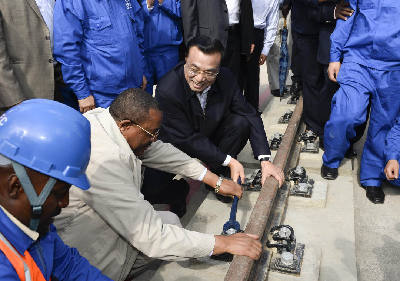China Headlines: China's new human rights report highlights development, rule of law
BEIJING, June 8 (Xinhua) -- The Chinese government released a white paper on Monday highlighting the progress of human rights protection in the legal system as well as economic and social development. "The tremendous achievements China has made in its human rights endeavors fully demonstrate that it is taking the correct path of human rights development that suits its national conditions," the white paper, published by the State Council Information Office under the title "Progress in China's Human Rights in 2014", said. China's legal reform gained momentum when the Communist Party of China (CPC) leadership adopted a comprehensive plan to promote rule of law at a key meeting last October. "The fundamental purposes of the blueprint are to protect civic rights, to defend human dignity and to put basic human rights into practice," the report notes. Unlike previous reports, this year's white paper has a single chapter about protecting people's right to impartial trials. Zhu Liyu, deputy director of the Center for Human Rights Studies of the People's University of China, told Xinhua legal reform has been one of the most notable progresses for human rights protection in China in the past two years. A number of new measures were made to improve the transparency and efficiency of judicial departments, empower them to better supervise administrative power and protect civic rights, which are of profound significance, Zhu said. "In the cases that a person's rights are violated by administrative power, the judicial system will be the last resort. Without the legal system, it is impossible to actually protect human rights," he said. In 2014, China also made notable progress in realizing its development targets. By the end of the year, among all the 29 countable or measurable indicators for economic and social development set forth in the 12th Five-Year Plan (2011-2015), 12 had been over-fulfilled, three had been nearly fulfilled and 11 had made smooth progress, accounting for 90 percent of the total. The mid-stage assessment of China's National Human Rights Action Plan (2012-2015), conducted in December 2014, showed most of the targets set had been reached and a larger part of the quantitative indices had been by achieved half or more. The white paper is China's 12th report on human rights since the government began releasing such reports in 1991. The report, with nine chapters and 14,000 words, details the progress the country made in protecting people's right to development, democracy, impartial trials and a clean environment, as well as the rights of women, children, senior citizens, ethnic minorities and the disabled. LEGAL REFORM IMPROVES JUDICIAL JUSTICE Judicial justice and transparency were greatly improved in 2014 thanks to reform measures in the judicial system. Courts, procuratorates and police worked hard to prevent and correct unjust, false and wrongful practices from investigation and prosecution to trials. In 2014, courts nationwide reheard 1,317 cases and corrected a number of wrongful ones. One high-profile wrongful conviction involved a rape-murder case in 1996 by an Inner Mongolian court, in which an 18-year-old man named Huugjilt was convicted and executed. In December 2014, 18 years later, he was acquitted of the crimes. The Supreme People's Court established a website for litigants to follow the progress of their cases and to disclose judgment papers. In 2014, a total of 6.29 million judgments were published through the website. Procuratorates also set up a nationwide system for case procedure information inquiries, legal documentation disclosure, information disclosure of major cases and application by appointment for defense and representation. In 2014, China revised the Administrative Litigation Law, expanding citizens' rights to sue the government and easing the procedure. Courts across the country heard 151,000 administrative first cases and concluded 131,000 of them, up 16.3 percent and 8.3 percent, respectively, from 2013. HIGHER INCOME, BETTER EDUCATION Nationwide annual per capita disposable income reached 20,167 yuan (3,290 U.S. dollars) in 2014, up 8 percent over the previous year and faster than the economic growth rate in 2014. Substantial efforts were made to alleviate poverty, including more government funds for infrastructure in the least-developed rural areas and relocation of people in uninhabitable regions. By the end of 2014, the number of rural residents with an annual income less than 2,300 yuan had decreased by 12.32 million to 70.17 million. Guarantee of educational equity has also been improved. Approximately 92.6 percent of children of school age received the nine-year compulsory education and 86.5 percent were enrolled in senior high schools. Being the world's largest developing country, the right to development is still the most important human right in China, said Liu Huawen, secretary general of Center for Human Rights Studies of the Chinese Academy of Social Sciences. "Easier access to health care service, better houses, stable jobs and higher income are all tangible improvements for ordinary Chinese," Liu said. He also considered China's fierce anti-corruption campaign as a solid contribution to human rights protection, since cleaner governments and more diligent officials will take better care of people's rights and welfare. "The concept of human rights varies in different countries and will be updated according to the changing reality. The rest of the world should respect China's unique conditions and traditions and give us more time to develop," he said.

